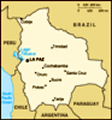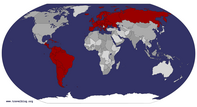Advertisement
Published: September 12th 2009
Filadelfia, in the Paraguayan Chaco, seemed like an obvious stopover for us en route from Concepcion to Sucre, Bolivia.
Here´s what the Lonely Planet (as misleading as ever) had to say about the town: "This neat Mennonite community...resembles a suburb of Munich...most of the town´s inhabitants are European descendants and Guten Tag is a regular greeting".
Guten Tag me arse!
I had in mind a dustier version of the Mennonite community we camped in during our time in Belize. Reserved but friendly, and the women made delicious cakes. As for Filadelfia? In the two whole days (two days too long) we didn´t see one pair of dungarees or a beard missing a moustache. Paraguayans are all bilingual (speaking Spanish and Guarani) but we didn´t hear a whisper of German spoken in Filadelfia. There was literally nothing to see, nowhere to go and very limited time frames within which we could find food.
But leaving was not going to be a simple affair. We knew one thing for sure. We had to go north to a place called Mariscal Estigarribia in order to get our exit stamp from Paraguay. Beyond that, there was literally no information to be
found anywhere and everyone we asked in Filadelfia (none of whom were slightly European looking) either didn´t know or didn´t care.
After being firmly shut all day, the bus office (the title of ´bus station´would have flattered it) opened at 7pm. We found out that the bus to Mariscal Estigarribia leaves around 8pm or 8.30pm - the ticket man couldn´t say for sure, but he advised us to arrive at the office at 7pm to be safe. As we had already checked into a hotel, that meant another 24 hours in Filadelfia. And to make matters worse, it was a Sunday the next day. If the place was as dead as a ghost town on a Saturday, it was going to be beyond resurrection tomorrow. So Sunday was spent counting the hours until the bus office opened.
Back at the bus office the next night, the staff couldn´t really say if there was a bus terminal in Mariscal Estigarribia or exactly where the immigration office was. When the bus eventually appeared at 9pm, the bus driver vaguely grunted when we asked for immigration and hurried us on board. Sixty minutes later we heard a shout "¡Migracion!" and the
bus stopped quite literally in the middle of nowhere in the pitch dark of night. "Where?" we asked. The driver pointed at a shack to the side and ushered us onto the side of the road. We´re going to be stranded here for days, I thought.
Outside the shack that was immigration, we were relieved to hear a football match on television inside and some voices. After knocking and shouting for ten minutes, a man finally emerged. "How did you get here?" he demanded, annoyed we had disturbed him watching the game (I personally think he had waited until half time to come out). "You wait here," he said pointing to some chairs on the front porch. "A bus to Bolivia comes through at 2am, I´ll stamp your passports then." With that he closed the door in our faces. There was nothing we could do but wait and hope we´d understood his Spanish correctly - that the bus was coming at two in the morning, not at two in the afternoon or even sometime on the 2nd! A three legged dog and a few hundred mosquitoes kept us company. Occasionally a motorbike would pass by. They were exciting moments.
Amazingly, at two on the dot the bus pulled up. Immigration official grudingly stamped our passports. There was only one cramped seat on board at the very front. Ever the gent, James let me take it. I found out later that he had to sit on the floor at the back by the toilet until a soldier got off and James jumped in his grave. Just as I was trying to dose, the second driver emerged from the cab and threw me off my seat. Outrageous! So for the next five hours until someone else got off the bus, James and I shared one seat.
The bus was going to Santa Cruz and not Sucre, where we were aiming for. The bus conductor said we could get a bus from Sucre from Santa Cruz. No, we said, that´s another fifteen hours. Sucre is nearer here than Santa Cruz, there must be another way. Two passengers overheard our questions and an argument ensued. One lady said a bus to Sucre passed a crossroads in Camiri at 11am and we would be in Sucre by late afternoon. Another lady said this bus would never make Camiri by eleven and we
should get off in Villamontes instead. We didn´t know what to do or who to trust.
The money changers at the Bolivian border post couldn´t agree either. There were three definite schools of thought.
(1) Camiri did have a crossroads, one way went towards Sucre and there were sometimes buses.
(2) Villamontes probably had buses to Sucre, but of all the options this one was the most argued over.
(3) It was not possible to get to Sucre and we should go to Santa Cruz.
We stayed on the bus and hoped for a sign to guide us. The sign came in the form of a mural on a petrol station wall in the hotly disputed town of Villamontes. The mural indicated that Tarija was 265km away. Tarija - that rang a bell. James whipped out the Lonely Planet (ok ok it is useful). Yes Tarija was in it alright, the wine producing region of Bolivia. That would do nicely. But could we get there? Of course, smiled the girl in the petrol station. The buses leave around seven in the evening and the terminal is just one block over there. Easy.
So now we had a
clear option, jump off now for Tarija or continue in blind faith to a crossroads for a bus to Sucre. Only one thing for it. When in doubt toss a coin. To the utter bemusemet of the other passengers, we flipped a coin. Heads. It changed our destiny. Tarija was chosen. The passenger who had told us to get off in Villamontes was delighted and gloating. "Good choice, Tarija is lovely," she said beaming.
Time was easier to kill in Villamontes than in Filadelfia. We found speedy internet access and a little place that cooked us up a smashing fried egg and chips, the yellow was perfectly runny and the home-cut chunky chips were the best on the entire trip so far.
Another sleepless all nighter bus ride took us to Tarija, blaring Bolivian country music as the bus rattled on a track winding around mountains that we couldn´t see. All made worse by the fact that we were beginning to smell. Badly. Even though we woke him at 5am, the hotel owner in Tarija wasn´t annoyed and swiftly found us a room. There was all day hot water and the mattress was super comfy. We melted into
it, exhausted. Things were looking up.
Not exactly an internationally renown producer of wines, Bolivia seems like an unlikely location for a trip to a vineyard. For a start, the vineyards around Tarija sit at 1,700m above sea level, an altitude that would give European wines vertigo. But the soil and the climate are ideal. It is even said that the altitude improves the grapes. It was in God´s name that the first drops of vino were produced at such dizzying heights, the Jesuits made wine here during the 17th century to supply their missions in Bolivia and Paraguay.
The journey to El Valle de la Concepcion, half an hour from the centre of Tarija, did not look promising. The barren valley looked so dry it was hard to believe anything grew out there at all. At the Casa Vieja winery we were told that there are no grapes on the vines at this time of year, but we should come back in February when there is a big harvest festival.
Never drink on an empty stomach - so we sampled the offerings of the kitchen first. To accompany the good food, we were served a carafe
of red wine poured straight from the vat. It tasted like it was laced with vodka. That was the beginning of a hilarious afternoon.
The shop had a strict policy of ´try before you buy´. We were in the company of two couples from La Paz who were all very tipsy. All the wines we tasted were made on the premises without the use of chemicals and were unfiltered, giving the wine a cloudy appearance. Our best mate for the afternoon was Gabriel who presumably worked on the theory that drunk clients buy more. There were dry reds, dry whites, sweet reds, sweet whites, ports...Gabriel just kept pouring. It got to the stage that we were retesting wines we had already tasted as we couldn´t remember what they were like. We bought one red and one white (I think Gabriel was disappointed, the guys from La Paz bought boxes) and headed home sleepy and giggly. Our nightmare journey through the Chaco seemed like ages ago, a distant hazy memory.
From Jess
Advertisement
Tot: 0.078s; Tpl: 0.015s; cc: 13; qc: 27; dbt: 0.0426s; 1; m:domysql w:travelblog (10.17.0.13); sld: 1;
; mem: 1.1mb
















Joy
non-member comment
Journey from hell
Couldn't stop laughing ( and feeling sorry for you both ) as I read yoyr hilarious account of your escape from Filadelfia ! As I read,I actually thought 'They could do with a glass of wine or beer' .Was wonderful to read on and here about your wine tasting afternoon. I'm sure you both slept very well. I have never tasted or seen Bolivian wine here but wil keep a lookout for it now.